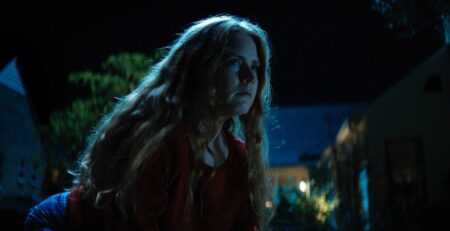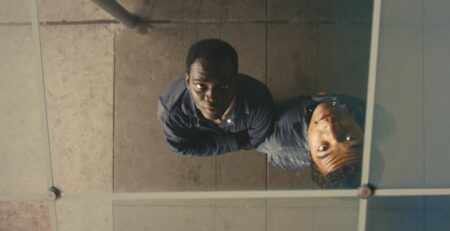Shot with a deliberate delicacy that highlights the strain of self-discovery that swallows us whole as teenagers, Aristotle and Dante Discover the Secrets of the Universe is a tender-hearted coming-of-age story. Based on the popular YA novel by author Benjamin Alire Sáenz, the film, directed by Aitch Alberto, lovingly brings these characters to life. Embodied with a sense of quiet wonderment that allows viewers to remember their adolescence through the palpable heat that radiates in waves of the pavement and the rain storms that stop time, Alberto demonstrates a keen understanding of how to visualize this story of in-between days. It captures how, sometimes, love blooms through small confessions over time rather than major declarations.
Aristotle and Dante Discover the Secrets of the Universe is one of the better adaptations in quite some time due to the direction that seeks to reach beyond simple retelling.
The film follows Mexican-American teenagers Aristotle (Max Pelayo) and Dante (Reese Gonzales) whose meeting might as well be foretold by their names — something that causes them to bond and laugh together upon first meeting. It’s 1987, and Ari is trying to learn to swim. Dante offers to teach him. From there the two spend summer days together, attached at the hip, until Dante moves away for a while and their correspondence turns to written letters. As Ari learns more about his family life while trying to figure out what his life has in store for him, he and Dante grapple with sexuality and their racial and ethnic identity while living in El Paso, Texas in the 1980s.
If anything is lost in the adaptation it’s the family life between Ari and his parents, one of the richer portions of Sáenz’s novel. Veronica Falcón and Eugenio Derbez are both superb but they aren’t able to dig into the pervasive melancholy of these characters in the way the book can explore, something that comes down to the amount of time allowed for the film. Instead, more time is spent on Ari’s struggle with his sexuality as he tries to find different distractions to avoid thoughts about Dante, from kissing girls to drinking. But these two are linked, be it in friendship or something more, especially as Dante begins to tell Ari of his own experiences, quicker to embrace his sexuality.

Pelayo and Gonzales are tremendous in these roles, each reaching for a level of vulnerability that makes both of their struggles tangible. Pelayo in particular delivers a strong performance that hinges so much on his ability to guard his emotions while still making sure the audience knows how much he’s enduring. His physicality suggests confidence but his eyes give him away. The two share genuine chemistry as we watch them weave in and out of their lives, fated to orbit the other no matter the demons they’re dealing with.
But what truly elevates this adaptation is the direction by Alberto. From the sun-bleached frames of Ari leaning against the exterior of his job, to two critical rain storms — one, a catalyst, the other, catharsis — Alberto captures the elements with as much care as she does the faces of the leads. This isn’t simply putting text to screen. Instead, Alberto along with the cinematography by Akis Konstantakopoulos and editing by Stefanie Visser and Harry Yoon understand that the visual, cinematic language is the opportunity to breathe not greater life into the story as it’s already so potent and ripe with emotion on the page, but instead that it’s the chance to bring something new. Readers are well acquainted with Ari and Dante’s story, and the film seeks to find different angles and frames in which to define their tale. It’s a shame more adaptations don’t seek the same route.
Aiding it further and twinging it with even greater whimsy and heartache is the score from Isabella Summers, best known for her work with Florence and the Machine. The music, along with the frames of Ari’s vacant bedroom opposed to Dante’s which is overflowing, create a fully formed universe. The story itself might be lacking in pieces with not enough focus being put on Ari’s dynamic with his parents and his worry about turning out like his brother, but the world is detailed and textured so that we never question who these two characters are.
A loving ode and celebration of queer love and familial support even in the face of violence and vitriol, Aristotle and Dante Discover the Secrets of the Universe burns bright. Anchored by two bright performances by actors who understand their characters and elevated by the direction that suggests an incredible future, the film exemplifies what an adaptation should aspire to be. Taking something established through text and spinning it in a new, visually dynamic light.
Aristotle and Dante Discover the Secrets of the Universe is in theaters on September 8.
Aristotle and Dante Discover the Secrets of the Universe
-
Rating - 8/108/10
TL;DR
A loving ode and celebration of queer love and familial support even in the face of violence and vitriol, Aristotle and Dante Discover the Secrets of the Universe burns bright. Anchored by two bright performances by actors who understand their characters and elevated by the direction that suggests an incredible future, the film exemplifies what an adaptation should aspire to be.





